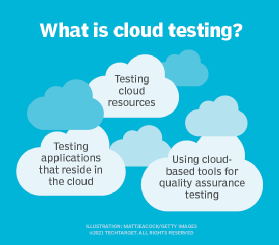
Sergey Nivens - Fotolia
Top types of cloud testing organizations need to perform
Move to cloud-based testing to reduce overhead and avoid production missteps. Learn about testing types and some notable vendors to get your IT team started.
Today, enterprises race to release software as early as possible, so time to market plays a key role in determining their success. However, without proper testing, the final product could turn out to be worthless.
There is always a need for tools and techniques that accelerate the development and testing process. On-premises testing entails huge upfront costs and ongoing maintenance. On the other hand, cloud testing is comparatively less expensive and is used for testing cloud, web and installed applications. It takes advantage of cloud-based tools to emulate real-world traffic and measures performance, scalability, security and reliability.
To properly test, admins and developers must know the top types of cloud testing, as well as notable vendors in this space.
Types of cloud testing
Cloud testing is divided into two general groups: functional and nonfunctional.
Functional testing
This approach checks each software application function or feature to determine if it is working as desired. Functional testing types for cloud include the following:
- System testing. Checks if all the use cases in the application are satisfied.
- User acceptance testing. End users verify the business requirements for the cloud-based application are satisfied.
- Interoperability testing. Verifies if the application can work properly if there is any change in the infrastructure.
Nonfunctional testing
These testing techniques are used to reduce production risks by verifying the nonfunctional requirements of the application, such as how the application operates. This includes performance, scalability, maintainability, usability and reliability. Nonfunctional testing types include the following:

- Performance testing. Incorporates stress and load testing to gauge the application's performance during heavy loads or when many users access the application.
- Availability testing. Checks to see if there are any outages and if there are any changes on the cloud provider's end.
- Security testing. Helps determine and reduce vulnerabilities.
- Disaster recovery testing. Ensures data is not lost, even during an outage or downtime.
- Multi-tenancy testing. Guarantees data on a shared system is isolated and checks for any negative multi-tenant impacts on performance or availability.
Cloud-based testing tools to know
Cloud-based testing reduces total cost of ownership compared to traditional systems because it requires little setup and no licensing fees. It also requires finding the right tool for the job. The following services can help determine the stress, load, performance, functionality, compatibility, latency and browser performance of applications deployed on cloud infrastructure.
Akamai CloudTest
Akamai CloudTest is used for performance and functional testing of mobile and web applications. It can simulate millions of concurrent users for load testing as well. Its features include the following:
- customizable dashboard;
- Stress tests on AWS, Microsoft Azure and other clouds;
- visual playback editor; and
- visual test creation.
AppPerfect
AppPerfect tests web applications on a distinct combination of hardware, web browsers and platforms. This on-demand, scalable managed service includes the following:
- functional, security and load testing;
- test script design and recording;
- ability to view and export test results; and
- comprehensive reporting.
AppThwack
AppThwack is a multi-platform, customizable testing tool compatible with automation platforms such as Calabash and Robotium. It tests web and mobile applications and includes the following features:
- built-in test framework, removing the need to write or manage test scripts; and
- detailed test report generation.
BlazeMeter
BlazeMeter simulates a number of test cases and operates load and performance testing. It provides support for real-time reporting and works with open source tools, APIs and more. This testing service includes features, such as the following:
- continuous testing for mobile and mainframe applications; and
- real-time reporting and analytics.
LoadStorm
LoadStorm is a cost-effective, scalable cloud-based testing tool for web and mobile applications. It works for applications with huge daily traffic and simulates as many virtual users as desired to perform real-time load testing. Important features include the following:
- scalability checks on web and mobile applications; and
- advanced reporting to present performance data under load tests.
Nessus
Nessus is designed to scan and detect vulnerabilities, such as missing patches or issues with firewalls or cloud infrastructure. It detects threats, such as malware and viruses, and includes the following features:
- automatic plugin updates;
- pre-built policies and templates; and
- vulnerability scans.







